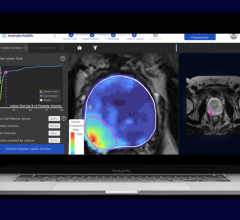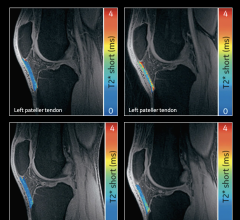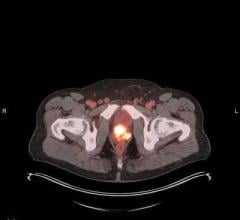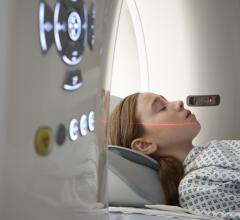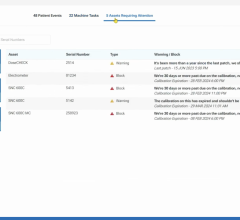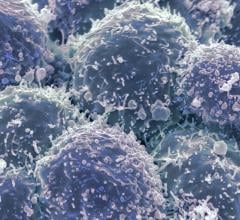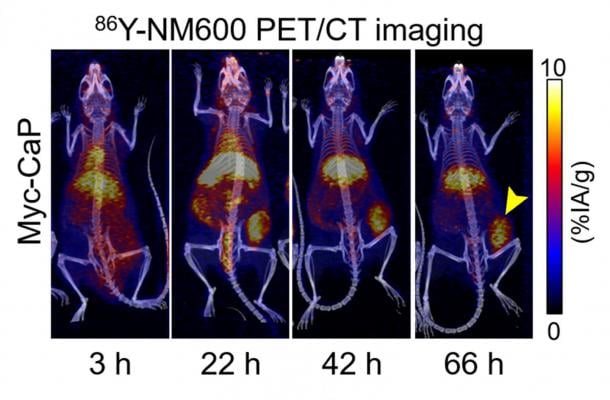
PET/CT imaging showing uptake and retention of 86Y-NM600 (imaging agent) in immunocompetent mice bearing prostate tumors. PET imaging data was employed to estimate tumor dosimetry and prescribe an immunomodulatory 90Y-NM600 (therapy agent) injected activity. Image courtesy of R Hernandez et al., University of Wisconsin-Madison, WI.
July 15, 2020 — Targeted radionuclide therapy has been found to create a favorable tumor microenvironment in prostate cancer that improves the effectiveness of immunotherapies. The research, presented at the Society of Nuclear Medicine and Molecular Imaging's 2020 Annual Meeting, shows that immunomodulation can be achieved with relatively low radiation dose that does not affect the normal immune system.
Due to a significantly immunosuppressive tumor microenvironment, immunotherapy has had limited success in the treatment of prostate cancer. External beam radiotherapy, which has been shown to remodel the tumor microenvironment of irradiated tumors to make them more immune-susceptible even at low radiation doses, is limited to the localized disease setting.
"Understanding this treatment dynamic, our goal in this study was to demonstrate that systemically delivered targeted radionuclide therapy provides beneficial immunomodulatory effects that may enhance the response of prostate cancer to immunotherapies," said Reinier Hernandez, Ph.D., assistant professor of medical physics and radiology at the University of Wisconsin-Madison in Madison Wisconsin.
In the study, male mice bearing syngeneic prostate tumor allografts were administered 86Y-NM600 and received positron emission tomography/computed tomography (PET/CT) scans at three, 24, 48 and 72 hours after injection. Radiotracer uptake was analyzed in tumors and in healthy tissues, which allowed researchers to estimate the dosimetry for the targeted radionuclide therapy 90Y-NM600.
Groups of mice were administered either a high or low dose of 90Y-NM600, and tumor growth and survival were monitored for 60 days. A separate group of mice received the same 90Y-NM600 doses and were euthanized to analyze the immunological effects (flow cytometry, immunohistochemistry and Luminex cytokine profiling) of the radionuclide therapy on the tumor microenvironment and lymphoid tissues.
Data from PET/CT imaging revealed that 90Y-NM600 immunomodulates the tumor microenvironment of prostate tumors by modifying tumor-infiltrating lymphocyte populations, upregulating checkpoint molecules, and promoting the release of pro-inflammatory cytokines. 90Y-NM600's pro-inflammatory effects on the tumor microenvironment were found to be elicited at relatively low radiation doses without incurring systemic toxicity.
"Our results provide a rationale for combining targeted radionuclide therapy with immunotherapies, which, so far, have proven ineffective in prostate cancer. Improving immunotherapy in prostate cancer could bring about a potentially curative treatment alternative for advanced-stage patients. We are actively working to advance the immunomodulation concept into Phase I clinical trials," stated Hernandez.
The study also presents a paradigm change in targeted radionuclide therapy, where the maximum tolerable dose may not always be the most beneficial to patients. "A key finding of our work is that immunomodulation is best achieved with a relatively low radiation dose to the tumor which does not affect the normal immune system," Hernandez noted. "As high radiation doses to normal lymphoid organs can negate the benefits of immunomodulation, estimating the radiation doses imparted to the tumor and normal tissues prospectively by using patient-specific image-based dosimetry techniques is critical. This means that, essentially, a theranostic approach must be implemented."
Abstract 36. "Low-dose TRT reshapes the microenvironment of prostate tumors to potentiate response to immunotherapy," Reinier Hernandez, Hemanth Potluri, Eduardo Aluicio-Sarduy, Joseph Grudzinski, Christopher Massey, Christopher Zahm, Jonathan Engle, Douglas McNeel and Jamey Weichert, University of Wisconsin-Madison, Madison, Wisconsin. SNMMI's 67th Annual Meeting, July 11-14, 2020.
For more information: www.snmmi.org
Related SNMMI20 Content:
PSMA PET/CT Can Change Management in Recurrent Prostate Cancer
Total-body Dynamic PET Successfully Detects Metastatic Cancer
New PET Radiotracer Proven Safe in Imaging Malignant Brain Tumors
Targeted Radionuclide Therapy Enhances Prostate Cancer Response to Immunotherapies
New PET/MRI Approach Pinpoints Chronic Pain Location, Alters Management


 May 17, 2024
May 17, 2024 

